【新课标】Unit 14 I can remember all of you in Grade 7. Section A 4a-4c课件(共54张PPT)
文档属性
| 名称 | 【新课标】Unit 14 I can remember all of you in Grade 7. Section A 4a-4c课件(共54张PPT) | 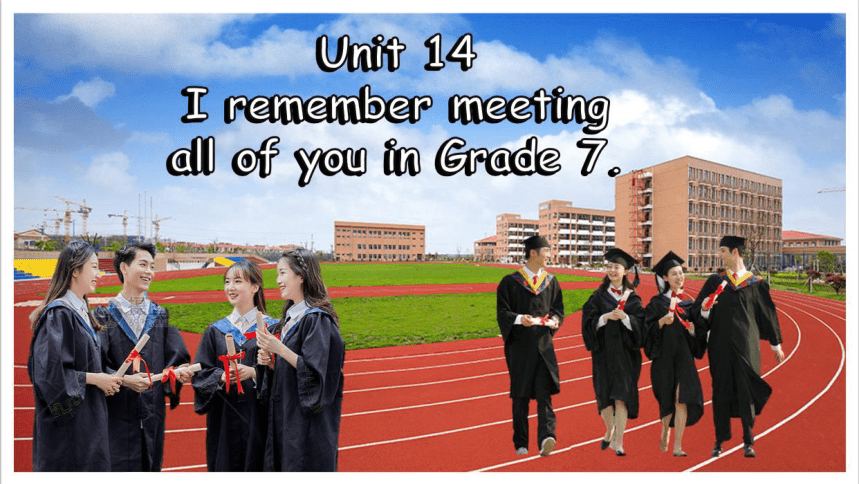 | |
| 格式 | zip | ||
| 文件大小 | 3.0MB | ||
| 资源类型 | 试卷 | ||
| 版本资源 | 人教新目标(Go for it)版 | ||
| 科目 | 英语 | ||
| 更新时间 | 2023-03-08 06:41:19 | ||
图片预览

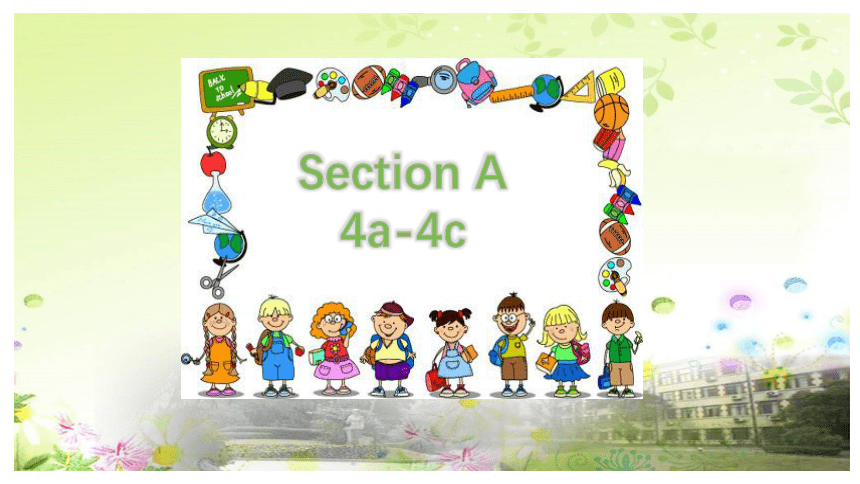
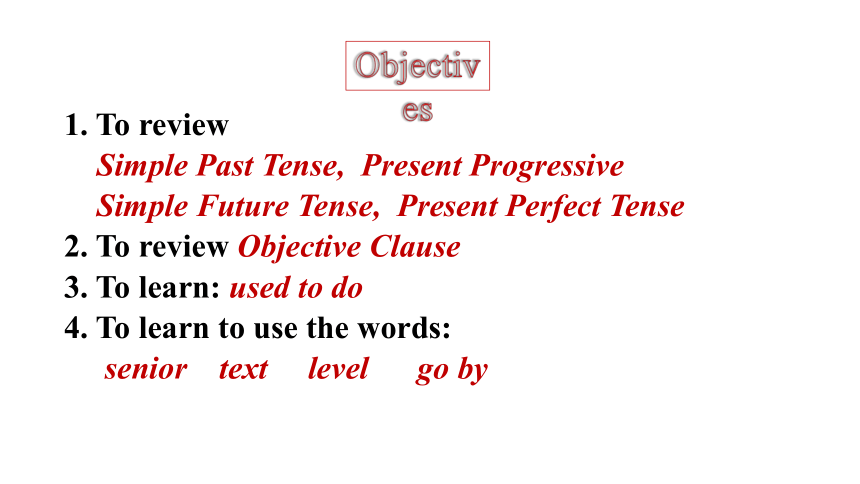
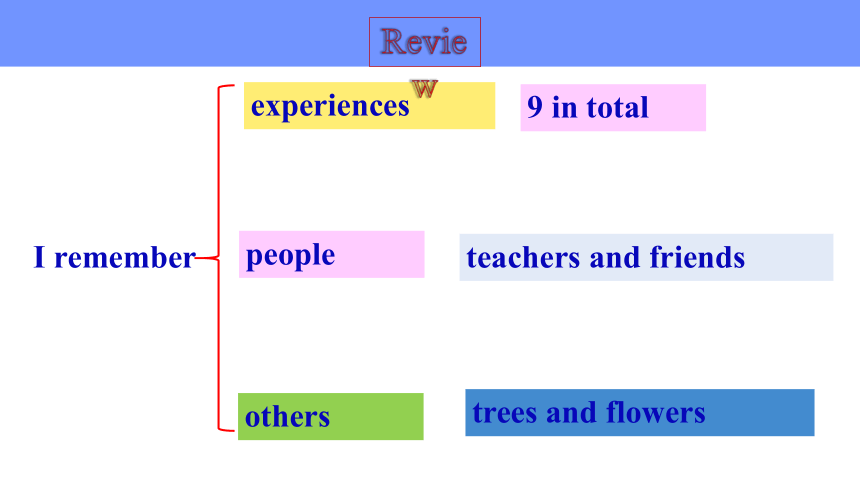
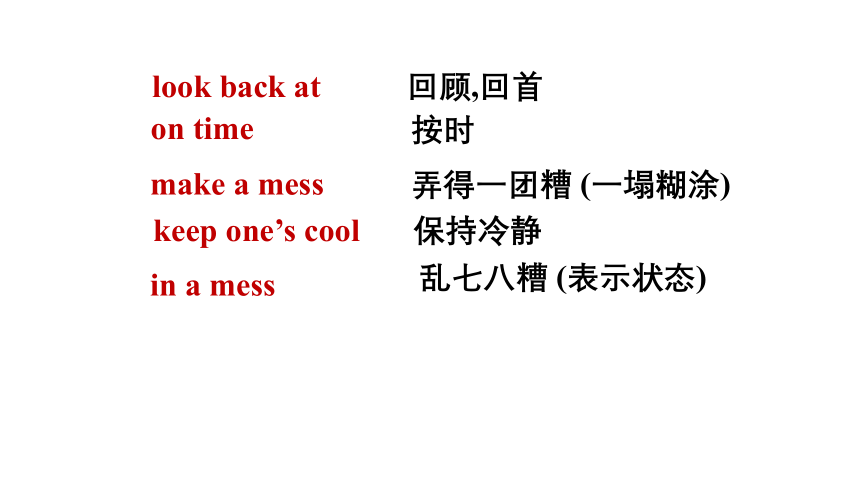
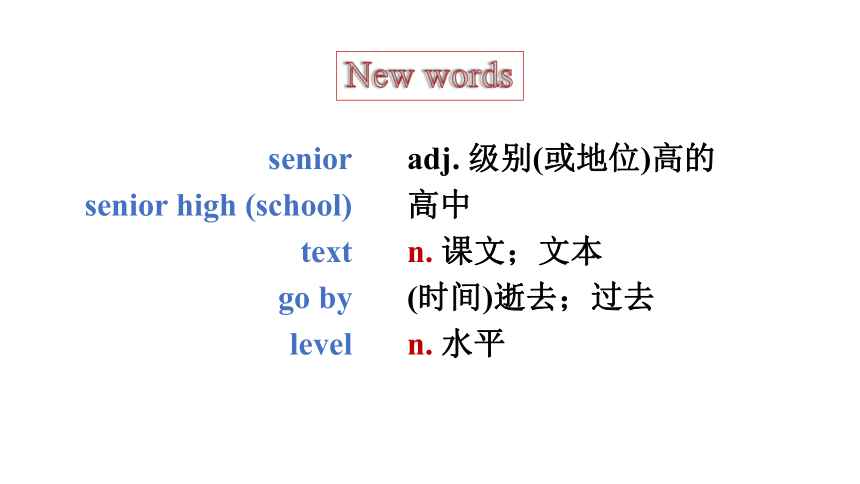
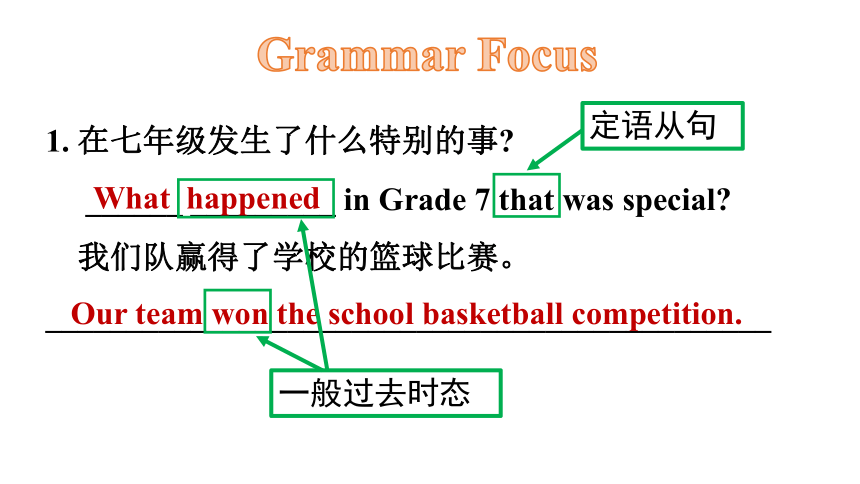
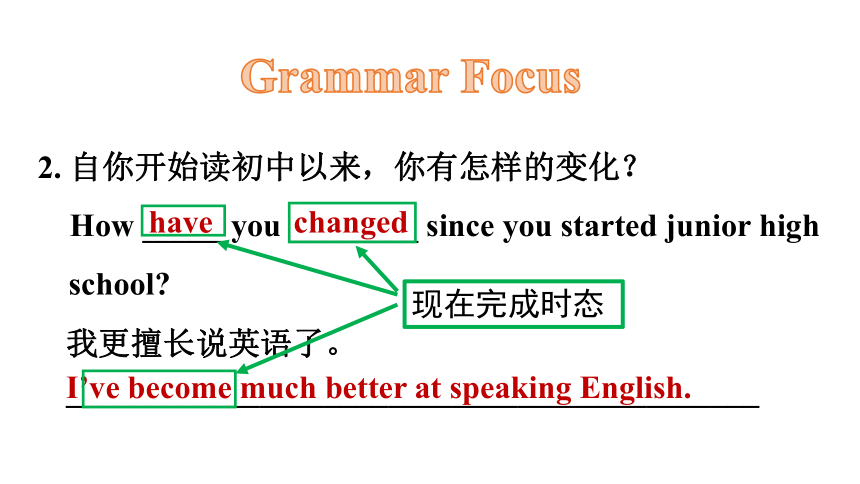
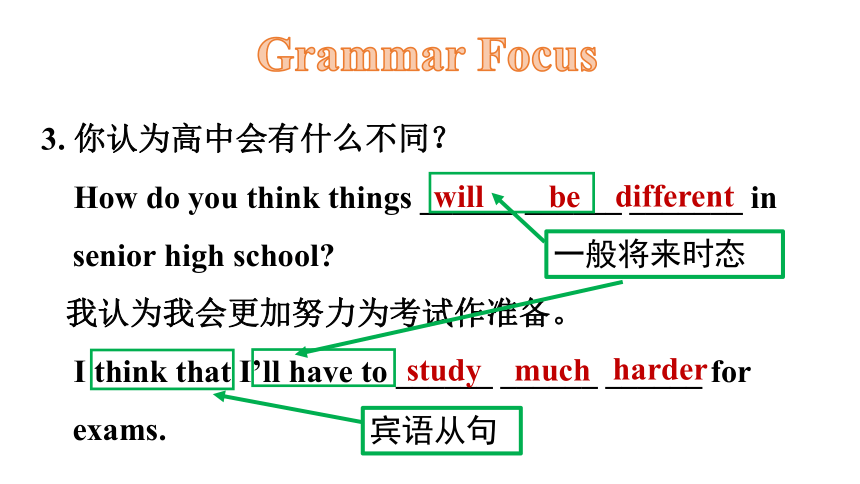
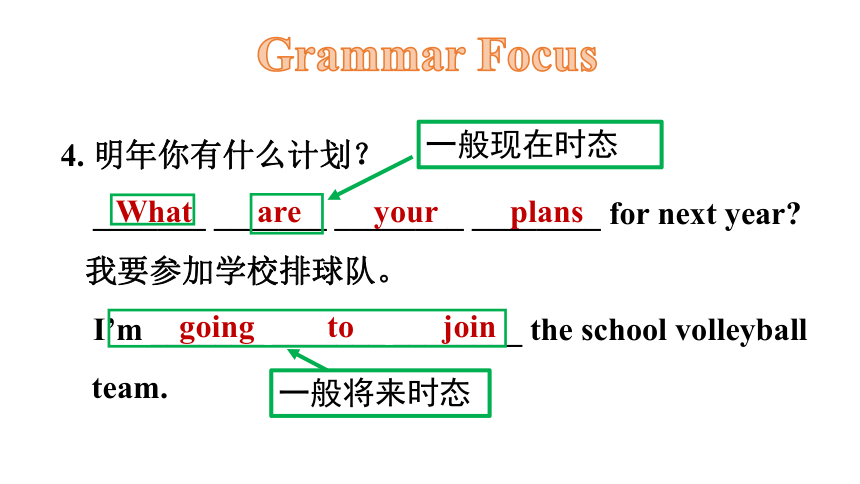
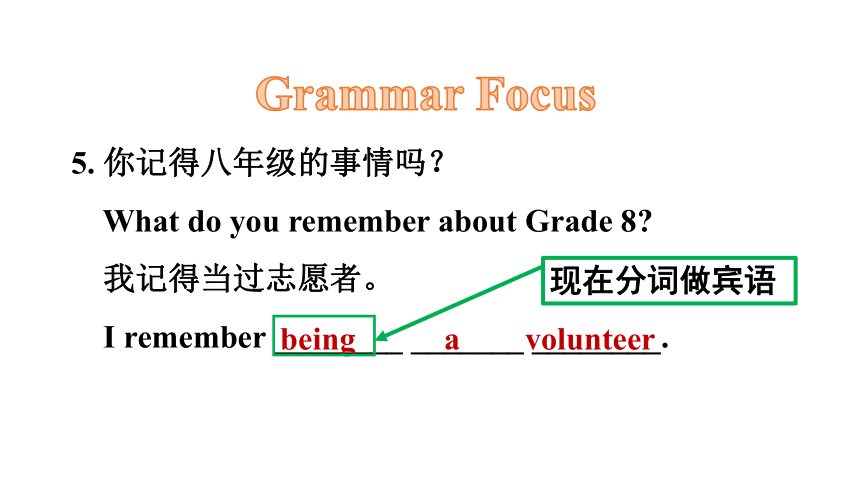
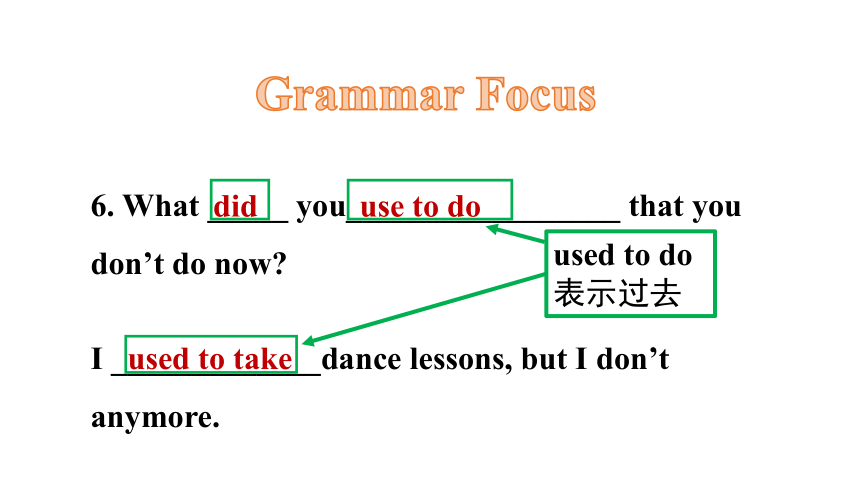
文档简介
(共54张PPT)
Section A
4a-4c
Objectives
1. To review
Simple Past Tense, Present Progressive
Simple Future Tense, Present Perfect Tense
2. To review Objective Clause
3. To learn: used to do
4. To learn to use the words:
senior text level go by
I remember
experiences
people
others
9 in total
teachers and friends
trees and flowers
Review
look back at
on time
make a mess
keep one’s cool
in a mess
保持冷静
回顾,回首
按时
弄得一团糟 (一塌糊涂)
乱七八糟 (表示状态)
New words
senior
senior high (school)
text
go by
level
adj. 级别(或地位)高的
高中
n. 课文;文本
(时间)逝去;过去
n. 水平
1. 在七年级发生了什么特别的事
______ _________ in Grade 7 that was special
我们队赢得了学校的篮球比赛。
_____________________________________________
What happened
Our team won the school basketball competition.
Grammar Focus
一般过去时态
定语从句
我更擅长说英语了。
___________________________________________
I’ve become much better at speaking English.
2. 自你开始读初中以来,你有怎样的变化?
How _____ you ________ since you started junior high school
have changed
Grammar Focus
现在完成时态
3. 你认为高中会有什么不同?
How do you think things ______ ______ _______ in senior high school
我认为我会更加努力为考试作准备。
I think that I’ll have to ______ ______ ______ for exams.
different
study much
harder
will be
Grammar Focus
一般将来时态
宾语从句
4. 明年你有什么计划?
_______ _______ ________ ________ for next year
我要参加学校排球队。
I’m _______ _______ ________ the school volleyball team.
What are your plans
going to join
Grammar Focus
一般将来时态
一般现在时态
5. 你记得八年级的事情吗?
What do you remember about Grade 8
我记得当过志愿者。
I remember ________ _______ ________.
being a volunteer
Grammar Focus
现在分词做宾语
6. What _____ you_________________ that you don’t do now
I _____________dance lessons, but I don’t anymore.
use to do
did
used to take
Grammar Focus
used to do 表示过去
are looking
7. What _______ you _________ forward to
I ___________forward to going to senior high school.
Grammar Focus
现在进行时态
’m looking
本单元重点复习
一般过去时
用法:表示过去某一时间或某一段时间内发生的动作或存在的状态,也可以表示过去经常或反复发生的动作。
结构:主语+ 动词过去式+ 其他
标志性词汇:yesterday, the day before yesterday, …ago,
…later, just now, at that moment, last…, in 2001, in the past, every day last year等。
主语人称 be动词形式
第一人称单数、第三人称单数
第一、三人称复数、第二人称
①谓语形式 Be
was
were
He _______ in the room five minutes ago.
They _________ all at work yesterday.
You, he and I _______all volunteers at that time.
was
were
were
②谓语形式 Do
→did
动词的规则变化
1. 一般在动词末尾加_____, 如: pull-pulled, cook-cooked
2. 结尾是e加____, 如: taste-tasted
3. 末尾只有一个元音字母和一个辅音字母的重读闭音节, 应_____________________________, 如: stop-stopped
4. 以“辅音字母+y”结尾的, ________________, 如: study-studied
-ed
d
双写末尾的辅音字母, 再加-ed
变y为i, 再加-ed
动词的不规则变化:
am/is-was are-were
do-did see-saw say-said give-gave
get-got go-went come-came have-had
eat-ate take-took run-ran sing-sang
put-put make-made read-read
write-wrote draw-drew drink-drank
fly-flew ride-rode speak-spoke
sweep-swept swim-swam sit-sat
一般将来时
用法:表示将来某个时间要发生的动作或存在的状态,或将来经常或反复发生的动作。
构成:will / shall + 动词原形(注意:主语为第一人称时使用shall)
标志性词汇:tomorrow, the day after tomorrow, next…, in five days, in the future, later on, soon, right now等。
“be going to + 动词原形”也可以表示将要发生的动作或打算、计划、决定要做的事。
一般将来时态的其他结构:
“am, is, are +v-ing”
be about to do sth.
be to do sth.
也可以表示将要发生的动作或打算、计划、决定要做的事。
Mom, I am coming! 妈妈, 我马上就来。
I am about to go up to my office when I decide to get a coffee… 我正要上我的办公室,这时我决定去买一杯咖啡。
现在进行时
用法:表示现在(说话瞬间)正在进行或发生的动作,也可表示当前一段时间内的活动或现阶段正在进行的动作。
构成:be (am / is / are)+动词的-ing形式。
标志性词汇:now, right now, look, listen等。
We are having an English lesson. 我们正在上英语课。
现在完成时态
用法:表示到现在为止已经发生或者完成的动作。或者表示某个动作或状态从过去一直持续到现在。
构成:has / have + 动词过去分词
标志性词汇:already,yet,just,since, for,in the past /last years 等。
They have already finished all the work. 他们已经完成了所有的工作。
She has waited there for one hour. 她已经在那里等了一个小时了。
现在完成时态
几个特殊的结构:
have/ has gone to, 去了某地,还没回来
have / has been to 去过某地,现在已经回到原地
have / has been in 在某地呆了多久,没有位置转移
Where is your father He has gone to New York.
你爸去哪里了? 他去了纽约。
I have been to the city for many times. 他去过这个城市很多次。
You have been in the park for five hours. 你已经在这个公园里呆了五个小时了。
时态 一般过去时 现在进行时 一般将来时 现在完成时
用法 表示过去某个时间发生的动作或存在的状态。 表示现在或现阶段正在进行或发生的动作。 表示将来某个时间要发生的动作或存在的状态。 表示过去发生或者未发生的事对现在造成的影响或结果
构成 方式 1. 动词was/were + 表语 2. 实义动词的过去式 + … be (am/is/are) + 动词的现在分词 1. will/shall + 动词原形 (shall 用于第一人称) 2. be going to + 动词原形 主语 + have / has + 过去分词 + …
句 型 变 化 疑 问 式 1. Was/Were + 主语 + … 2. Did +主语 +动词原形+... Be + 主语 + 动词的现在分词 + … 1. Will/Shall + 主语 + 动词原形+ … 2. Be + 主语+ going to + 动词原形 + … Have / Has + 主语 + 过去分词 + …?
否 定 式 1. 主语+was /were +not +… 2. 主语 + didn’t + 动词原形 + … 主语 + be + not + 动词的现在分词 + … 1. 主语 + will/shall not + 动词原形 + … 2. 主语 + be + not + going to + 动词原形 + … 主语 + haven’t / hasn’t + 过去分词 + …
宾语从句
学好宾语从句需要突破三关
连接词关
语序关
时态关
定义
在复合句中,用来充当宾语的句子叫做宾语从句。
He is an honest boy.
The teacher said.
Does he work hard
I wonder.
When did he leave
I don’t know .
The teacher said(that)he was an honest boy.
I wonder if/whether he works hard.
I don’t know when he left.
连接词关
从句来源是陈述句,连接词用that。
从句来源是一般疑问句,连接词用whether/if。
从句来源是特殊疑问句,连接词用who; whom; whose;which; when; where; why; how;what等。
将以上句子合并成宾语从句。
连接词
从句来源 连接词 备注
陈述句 that 口语或非正式文体中常省略
一般疑问句 if / whether
特殊疑问句 连接代词:who; whom; whose; which; what 等 在句中担任主、宾、定或表语。
连接副词:when; where; why; how等 在句中担任状语
语序关
宾语从句用陈述语序。
He is an honest boy.
The teacher said.
Does he work hard
I wonder.
When did he leave
I don’t know .
The teacher said(that)he was an honest boy.
I wonder if/whether he works hard.
I don’t know when he left.
1) 主句是现在的时态,从句的时态可根据实际情况而定。
时态关
2)主句是过去的某种时态,从句一定要用过去的某种时态。
We didn’t know why she had missed the flight.
3)如果宾语从句表述的是客观真理、自然现象等时,不管主句是什么时态,从句都要用一般现在时。
Mrs Brown said that in London, everyone
is different.
I hear that she has written three letters to
the headmaster.
②主句是过去的某种时态,
从句一定要用过去的某种时态。
主句时态 从句时态
一般现在时 一般过去时
一般过去时 过去完成时
现在进行时 过去进行时
一般将来时 过去将来时
现在完成时 过去完成时
过去进行时 过去进行时
【语境应用】将句子合并成宾语从句。
1. She bought a new camera yesterday. Li Fang said.
2. Writing is as important as speaking. I think.
Li Fang said (that) she bought a new camera yesterday.
I think (that) writing is as important as speaking.
3. Taiyuan is the capital city of Shanxi Province. The teacher told us.
4. You can speak French well. I believe.
The teacher told us (that) Taiyuan is the capital city of
Shanxi Province.
I believe (that) you can speak French well.
if和when既能引导状语从句,又能引导宾语从句。因此,遇到它们就要认真分析一下,它们究竟属于“两副面孔”的哪一副。如:
If it rains tomorrow, I won’t come.
(条件状语从句)
I don’t know if it will rain tomorrow.
(宾语从句)
如果
是否
过了三关是不是顿时轻松了呢?
千万别掉以轻心,还有一点需要提醒:有些词有“两副面孔”,见到了要注意区分。
单项选择
1. There _______ a basketball game next Monday. If it _______, we’ll have to put it off. (2020 云南)
A. is going to have; will rain
B. is going to have; rains
C. is going to be; rains D. is going to be; will rain
2. —Is Helen here
—Not yet, but she _______ in half an hour. (2020 湖北武汉)
A. arrives B. will arrive C. arrived D. has arrived
C
B
3. —Have scientists found life on Mars
—Not yet, but I think they _______ it some day.
A. find B. found
C. have found D. will find
(2020 浙江温州)
4. Listen! Our teacher _______ in the music classroom.
A. sings B. sang
C. will sing D. is singing
(2020 重庆A卷)
D
D
5. —Jack, I’m busy doing the washing. Can you give me a hand
—Wait a moment. I _______ the bed.
A. am making B. will make
C. was making D. have made
(2020 四川凉山州)
6. —Hello, John. This is Mike. What are you doing now
—I’m watching a film on TV. It _______ at 7: 30 and will be
on for another hour.
A. starts B. started
C. has started (2020 四川乐山)
A
B
7. —Have you ever _______ to Caozhou Peony Garden
—Yes, I _______ there last year.
A. been; went B. gone; went
C. been; gone (2020 山东菏泽)
8. Han Mei, a good friend of mine, _______ me a lot with my English in the past three years.
A. helps B. helped
C. has helped (2020 福建)
A
C
9. —How about the third season of documentary Aerial China
(航拍中国) (2020 湖北宜昌)
—Great. I _______ it twice.
A. watched B. watch
C. will watch D. have watched
10. —Could you tell me _______ we can start a conversation
with a foreigner (2020 安徽)
—Talking about weather is a good choice.
A. how B. why
C. where D. when
D
A
11. —Do you know _______ to see the Beijing Opera
—Yes, you can go to Mei Lanfang Theatre. (2020 天津)
A. where can we go B. where we can go
C. when shall we go D. when we shall go
12. —What did Lily say to you just now, Emma
—She wanted to know _______. (2020 湖北黄冈)
A. what will I do this Sunday
B. who did I play volleyball with just now
C. why I am late for class this morning
D. if I could go shopping with her tonight
B
D
Number the sentences to make a paragraph.
4a
Pay attention to the time
_____ When I get to senior high, I will join the school swim team.
_____ My time in junior high school has been enjoyable.
_____ In Grade 8, I studied harder but I still got poor grades in English. I had problems with pronunciation and reading texts. So the next year, I worked much harder and got better grades.
_____ Next year, I will be in senior high school. I can’t believe how fast the time went by!
_____ This year, with Mr. Trent’s help, my English level has been improving and I hope to get good grades at the end of the year.
_____ In the first year, I didn’t work very hard in class, but I joined many different school clubs and had a lot of fun.
3
5
6
1
4
2
n. 课文;文本
(时间)逝去;过去
n. 水平
According to 4a and write the timeline.
My time in junior high school (general introduction)
In the first year (Grade 7)
In Grade 8
This year (Grade 9)
Next year
When I get to senior high
1. What do you remember about Grade 7
2. What happened in Grade 8 that was special
3. What did you use to do that you don’t do now
I remember rushing to the dining hall every day.
I failed many tests and the teacher helped me with my lessons often.
Write your own answers to the questions.
I used to be afraid of giving a speech in public, but now I don’t.
4b
4. How have you changed since you started junior high school
5. How do you think things will be different in senior high school
6. What are your plans for next year
7. What are you looking forward to
I have been more outgoing.
There will be more homework and the subjects will be more difficult.
I will spend more time on schoolwork and do more reading.
I am looking forward to making more new friends.
Share your answers with different classmates.
the teacher that encourage you the most
the classmate that helped you the most
the subject you liked the most
your favorite place in school
your favorite food in the dining hall
4c
1. I’m looking forward to going to senior high school.
look forward to: to为介词,后面接动词的-ing形式。
My mother says she’s looking forward to meeting you.
我妈妈说她期待见到你。
Language points
2. I had problems with pronunciation and reading texts.
have problem with sth.
have problem doing sth. 做某事有困难。
When I was in my primary school, I often had problems talking to the teachers. 我小学的时候最怕见老师了。
3. I can’t believe how fast the time went by!
believe v. 相信,相信某人的话
believe in 信任,相信某人的人品。
I believe in you but now I don’t believe what you said. 我信任你,但我现在不相信你所说的话。
4. I hope to get good grades at the end of the year.
get good grades 取得好成绩
at the end of the year 在那年年底
at the end of + 时间, 在…结束的时候
at the end of +地点,在…终点
He left his job at the end of last March. 他在去年三月底辞职的。
We saw a huge white building at the end of the road. 在路的尽头,我们看见了一个巨大的白色的建筑物。
根据邮件内容及括号内所给动词的提示填空。
Dear Grace,
How are you Thanks for your last e-mail. Today the weather is great here. I checked the weather report in your city just now. It (1)_________(snow) now, right
Last week, we (2)_________(begin) classes. This year (3)________________(be) more difficult than last year. I must work harder. Next week I (4)____________________(start) my electric guitar classes again. In December we (5)___________________(play) in a school concert.
is snowing
began
is going to / will be
am going to / will start
are going to / will play
Exercises
We think it (6)_________________(be) a great success. Yesterday, I (7)_________(get) a letter from Maggie. Do you remember her She (8)__________(be) in hospital for the last month because she had a car accident while she (9)___________________(learn) to drive. Poor girl!
My parents are well. Mom (10)_________(work) very hard at the hospital and Dad (11)__________(be) in London for the last two days on a business trip.
Well, I must finish. Tonight I plan to see The Lost World. (12)_______ you ________(see) it A lot of people said it was fantastic.
Write soon.
is going to / will be
got
has been
was learning / learned
works
has been
Have
seen
senior high (school)
go by
with sb.’s help
look forward to
高中
(时间)逝去;过去
在某人的帮助下
盼望;期待
Summary
时态 一般过去时 现在进行时 一般将来时 现在完成时
用法 表示过去某个时间发生的动作或存在的状态。 表示现在或现阶段正在进行或发生的动作。 表示将来某个时间要发生的动作或存在的状态。 表示过去发生或者未发生的事对现在造成的影响或结果
构成 方式 1. 动词was/were + 表语 2. 实义动词的过去式 + … be (am/is/are) + 动词的现在分词 1. will/shall + 动词原形 (shall 用于第一人称) 2. be going to + 动词原形 主语 + have / has + 过去分词 + …
句 型 变 化 疑 问 式 1. Was/Were + 主语 + … 2. Did +主语 +动词原形+... Be + 主语 + 动词的现在分词 + … 1. Will/Shall + 主语 + 动词原形+ … 2. Be + 主语+ going to + 动词原形 + … Have / Has + 主语 + 过去分词 + …?
否 定 式 1. 主语+was /were +not +… 2. 主语 + didn’t + 动词原形 + … 主语 + be + not + 动词的现在分词 + … 1. 主语 + will/shall not + 动词原形 + … 2. 主语 + be + not + going to + 动词原形 + … 主语 + haven’t / hasn’t + 过去分词 + …
Homework
Review Grammar and different tenses.
Talk about the events in your junior school life.
2. Preview 1a-1e on page 109.
Section A
4a-4c
Objectives
1. To review
Simple Past Tense, Present Progressive
Simple Future Tense, Present Perfect Tense
2. To review Objective Clause
3. To learn: used to do
4. To learn to use the words:
senior text level go by
I remember
experiences
people
others
9 in total
teachers and friends
trees and flowers
Review
look back at
on time
make a mess
keep one’s cool
in a mess
保持冷静
回顾,回首
按时
弄得一团糟 (一塌糊涂)
乱七八糟 (表示状态)
New words
senior
senior high (school)
text
go by
level
adj. 级别(或地位)高的
高中
n. 课文;文本
(时间)逝去;过去
n. 水平
1. 在七年级发生了什么特别的事
______ _________ in Grade 7 that was special
我们队赢得了学校的篮球比赛。
_____________________________________________
What happened
Our team won the school basketball competition.
Grammar Focus
一般过去时态
定语从句
我更擅长说英语了。
___________________________________________
I’ve become much better at speaking English.
2. 自你开始读初中以来,你有怎样的变化?
How _____ you ________ since you started junior high school
have changed
Grammar Focus
现在完成时态
3. 你认为高中会有什么不同?
How do you think things ______ ______ _______ in senior high school
我认为我会更加努力为考试作准备。
I think that I’ll have to ______ ______ ______ for exams.
different
study much
harder
will be
Grammar Focus
一般将来时态
宾语从句
4. 明年你有什么计划?
_______ _______ ________ ________ for next year
我要参加学校排球队。
I’m _______ _______ ________ the school volleyball team.
What are your plans
going to join
Grammar Focus
一般将来时态
一般现在时态
5. 你记得八年级的事情吗?
What do you remember about Grade 8
我记得当过志愿者。
I remember ________ _______ ________.
being a volunteer
Grammar Focus
现在分词做宾语
6. What _____ you_________________ that you don’t do now
I _____________dance lessons, but I don’t anymore.
use to do
did
used to take
Grammar Focus
used to do 表示过去
are looking
7. What _______ you _________ forward to
I ___________forward to going to senior high school.
Grammar Focus
现在进行时态
’m looking
本单元重点复习
一般过去时
用法:表示过去某一时间或某一段时间内发生的动作或存在的状态,也可以表示过去经常或反复发生的动作。
结构:主语+ 动词过去式+ 其他
标志性词汇:yesterday, the day before yesterday, …ago,
…later, just now, at that moment, last…, in 2001, in the past, every day last year等。
主语人称 be动词形式
第一人称单数、第三人称单数
第一、三人称复数、第二人称
①谓语形式 Be
was
were
He _______ in the room five minutes ago.
They _________ all at work yesterday.
You, he and I _______all volunteers at that time.
was
were
were
②谓语形式 Do
→did
动词的规则变化
1. 一般在动词末尾加_____, 如: pull-pulled, cook-cooked
2. 结尾是e加____, 如: taste-tasted
3. 末尾只有一个元音字母和一个辅音字母的重读闭音节, 应_____________________________, 如: stop-stopped
4. 以“辅音字母+y”结尾的, ________________, 如: study-studied
-ed
d
双写末尾的辅音字母, 再加-ed
变y为i, 再加-ed
动词的不规则变化:
am/is-was are-were
do-did see-saw say-said give-gave
get-got go-went come-came have-had
eat-ate take-took run-ran sing-sang
put-put make-made read-read
write-wrote draw-drew drink-drank
fly-flew ride-rode speak-spoke
sweep-swept swim-swam sit-sat
一般将来时
用法:表示将来某个时间要发生的动作或存在的状态,或将来经常或反复发生的动作。
构成:will / shall + 动词原形(注意:主语为第一人称时使用shall)
标志性词汇:tomorrow, the day after tomorrow, next…, in five days, in the future, later on, soon, right now等。
“be going to + 动词原形”也可以表示将要发生的动作或打算、计划、决定要做的事。
一般将来时态的其他结构:
“am, is, are +v-ing”
be about to do sth.
be to do sth.
也可以表示将要发生的动作或打算、计划、决定要做的事。
Mom, I am coming! 妈妈, 我马上就来。
I am about to go up to my office when I decide to get a coffee… 我正要上我的办公室,这时我决定去买一杯咖啡。
现在进行时
用法:表示现在(说话瞬间)正在进行或发生的动作,也可表示当前一段时间内的活动或现阶段正在进行的动作。
构成:be (am / is / are)+动词的-ing形式。
标志性词汇:now, right now, look, listen等。
We are having an English lesson. 我们正在上英语课。
现在完成时态
用法:表示到现在为止已经发生或者完成的动作。或者表示某个动作或状态从过去一直持续到现在。
构成:has / have + 动词过去分词
标志性词汇:already,yet,just,since, for,in the past /last years 等。
They have already finished all the work. 他们已经完成了所有的工作。
She has waited there for one hour. 她已经在那里等了一个小时了。
现在完成时态
几个特殊的结构:
have/ has gone to, 去了某地,还没回来
have / has been to 去过某地,现在已经回到原地
have / has been in 在某地呆了多久,没有位置转移
Where is your father He has gone to New York.
你爸去哪里了? 他去了纽约。
I have been to the city for many times. 他去过这个城市很多次。
You have been in the park for five hours. 你已经在这个公园里呆了五个小时了。
时态 一般过去时 现在进行时 一般将来时 现在完成时
用法 表示过去某个时间发生的动作或存在的状态。 表示现在或现阶段正在进行或发生的动作。 表示将来某个时间要发生的动作或存在的状态。 表示过去发生或者未发生的事对现在造成的影响或结果
构成 方式 1. 动词was/were + 表语 2. 实义动词的过去式 + … be (am/is/are) + 动词的现在分词 1. will/shall + 动词原形 (shall 用于第一人称) 2. be going to + 动词原形 主语 + have / has + 过去分词 + …
句 型 变 化 疑 问 式 1. Was/Were + 主语 + … 2. Did +主语 +动词原形+... Be + 主语 + 动词的现在分词 + … 1. Will/Shall + 主语 + 动词原形+ … 2. Be + 主语+ going to + 动词原形 + … Have / Has + 主语 + 过去分词 + …?
否 定 式 1. 主语+was /were +not +… 2. 主语 + didn’t + 动词原形 + … 主语 + be + not + 动词的现在分词 + … 1. 主语 + will/shall not + 动词原形 + … 2. 主语 + be + not + going to + 动词原形 + … 主语 + haven’t / hasn’t + 过去分词 + …
宾语从句
学好宾语从句需要突破三关
连接词关
语序关
时态关
定义
在复合句中,用来充当宾语的句子叫做宾语从句。
He is an honest boy.
The teacher said.
Does he work hard
I wonder.
When did he leave
I don’t know .
The teacher said(that)he was an honest boy.
I wonder if/whether he works hard.
I don’t know when he left.
连接词关
从句来源是陈述句,连接词用that。
从句来源是一般疑问句,连接词用whether/if。
从句来源是特殊疑问句,连接词用who; whom; whose;which; when; where; why; how;what等。
将以上句子合并成宾语从句。
连接词
从句来源 连接词 备注
陈述句 that 口语或非正式文体中常省略
一般疑问句 if / whether
特殊疑问句 连接代词:who; whom; whose; which; what 等 在句中担任主、宾、定或表语。
连接副词:when; where; why; how等 在句中担任状语
语序关
宾语从句用陈述语序。
He is an honest boy.
The teacher said.
Does he work hard
I wonder.
When did he leave
I don’t know .
The teacher said(that)he was an honest boy.
I wonder if/whether he works hard.
I don’t know when he left.
1) 主句是现在的时态,从句的时态可根据实际情况而定。
时态关
2)主句是过去的某种时态,从句一定要用过去的某种时态。
We didn’t know why she had missed the flight.
3)如果宾语从句表述的是客观真理、自然现象等时,不管主句是什么时态,从句都要用一般现在时。
Mrs Brown said that in London, everyone
is different.
I hear that she has written three letters to
the headmaster.
②主句是过去的某种时态,
从句一定要用过去的某种时态。
主句时态 从句时态
一般现在时 一般过去时
一般过去时 过去完成时
现在进行时 过去进行时
一般将来时 过去将来时
现在完成时 过去完成时
过去进行时 过去进行时
【语境应用】将句子合并成宾语从句。
1. She bought a new camera yesterday. Li Fang said.
2. Writing is as important as speaking. I think.
Li Fang said (that) she bought a new camera yesterday.
I think (that) writing is as important as speaking.
3. Taiyuan is the capital city of Shanxi Province. The teacher told us.
4. You can speak French well. I believe.
The teacher told us (that) Taiyuan is the capital city of
Shanxi Province.
I believe (that) you can speak French well.
if和when既能引导状语从句,又能引导宾语从句。因此,遇到它们就要认真分析一下,它们究竟属于“两副面孔”的哪一副。如:
If it rains tomorrow, I won’t come.
(条件状语从句)
I don’t know if it will rain tomorrow.
(宾语从句)
如果
是否
过了三关是不是顿时轻松了呢?
千万别掉以轻心,还有一点需要提醒:有些词有“两副面孔”,见到了要注意区分。
单项选择
1. There _______ a basketball game next Monday. If it _______, we’ll have to put it off. (2020 云南)
A. is going to have; will rain
B. is going to have; rains
C. is going to be; rains D. is going to be; will rain
2. —Is Helen here
—Not yet, but she _______ in half an hour. (2020 湖北武汉)
A. arrives B. will arrive C. arrived D. has arrived
C
B
3. —Have scientists found life on Mars
—Not yet, but I think they _______ it some day.
A. find B. found
C. have found D. will find
(2020 浙江温州)
4. Listen! Our teacher _______ in the music classroom.
A. sings B. sang
C. will sing D. is singing
(2020 重庆A卷)
D
D
5. —Jack, I’m busy doing the washing. Can you give me a hand
—Wait a moment. I _______ the bed.
A. am making B. will make
C. was making D. have made
(2020 四川凉山州)
6. —Hello, John. This is Mike. What are you doing now
—I’m watching a film on TV. It _______ at 7: 30 and will be
on for another hour.
A. starts B. started
C. has started (2020 四川乐山)
A
B
7. —Have you ever _______ to Caozhou Peony Garden
—Yes, I _______ there last year.
A. been; went B. gone; went
C. been; gone (2020 山东菏泽)
8. Han Mei, a good friend of mine, _______ me a lot with my English in the past three years.
A. helps B. helped
C. has helped (2020 福建)
A
C
9. —How about the third season of documentary Aerial China
(航拍中国) (2020 湖北宜昌)
—Great. I _______ it twice.
A. watched B. watch
C. will watch D. have watched
10. —Could you tell me _______ we can start a conversation
with a foreigner (2020 安徽)
—Talking about weather is a good choice.
A. how B. why
C. where D. when
D
A
11. —Do you know _______ to see the Beijing Opera
—Yes, you can go to Mei Lanfang Theatre. (2020 天津)
A. where can we go B. where we can go
C. when shall we go D. when we shall go
12. —What did Lily say to you just now, Emma
—She wanted to know _______. (2020 湖北黄冈)
A. what will I do this Sunday
B. who did I play volleyball with just now
C. why I am late for class this morning
D. if I could go shopping with her tonight
B
D
Number the sentences to make a paragraph.
4a
Pay attention to the time
_____ When I get to senior high, I will join the school swim team.
_____ My time in junior high school has been enjoyable.
_____ In Grade 8, I studied harder but I still got poor grades in English. I had problems with pronunciation and reading texts. So the next year, I worked much harder and got better grades.
_____ Next year, I will be in senior high school. I can’t believe how fast the time went by!
_____ This year, with Mr. Trent’s help, my English level has been improving and I hope to get good grades at the end of the year.
_____ In the first year, I didn’t work very hard in class, but I joined many different school clubs and had a lot of fun.
3
5
6
1
4
2
n. 课文;文本
(时间)逝去;过去
n. 水平
According to 4a and write the timeline.
My time in junior high school (general introduction)
In the first year (Grade 7)
In Grade 8
This year (Grade 9)
Next year
When I get to senior high
1. What do you remember about Grade 7
2. What happened in Grade 8 that was special
3. What did you use to do that you don’t do now
I remember rushing to the dining hall every day.
I failed many tests and the teacher helped me with my lessons often.
Write your own answers to the questions.
I used to be afraid of giving a speech in public, but now I don’t.
4b
4. How have you changed since you started junior high school
5. How do you think things will be different in senior high school
6. What are your plans for next year
7. What are you looking forward to
I have been more outgoing.
There will be more homework and the subjects will be more difficult.
I will spend more time on schoolwork and do more reading.
I am looking forward to making more new friends.
Share your answers with different classmates.
the teacher that encourage you the most
the classmate that helped you the most
the subject you liked the most
your favorite place in school
your favorite food in the dining hall
4c
1. I’m looking forward to going to senior high school.
look forward to: to为介词,后面接动词的-ing形式。
My mother says she’s looking forward to meeting you.
我妈妈说她期待见到你。
Language points
2. I had problems with pronunciation and reading texts.
have problem with sth.
have problem doing sth. 做某事有困难。
When I was in my primary school, I often had problems talking to the teachers. 我小学的时候最怕见老师了。
3. I can’t believe how fast the time went by!
believe v. 相信,相信某人的话
believe in 信任,相信某人的人品。
I believe in you but now I don’t believe what you said. 我信任你,但我现在不相信你所说的话。
4. I hope to get good grades at the end of the year.
get good grades 取得好成绩
at the end of the year 在那年年底
at the end of + 时间, 在…结束的时候
at the end of +地点,在…终点
He left his job at the end of last March. 他在去年三月底辞职的。
We saw a huge white building at the end of the road. 在路的尽头,我们看见了一个巨大的白色的建筑物。
根据邮件内容及括号内所给动词的提示填空。
Dear Grace,
How are you Thanks for your last e-mail. Today the weather is great here. I checked the weather report in your city just now. It (1)_________(snow) now, right
Last week, we (2)_________(begin) classes. This year (3)________________(be) more difficult than last year. I must work harder. Next week I (4)____________________(start) my electric guitar classes again. In December we (5)___________________(play) in a school concert.
is snowing
began
is going to / will be
am going to / will start
are going to / will play
Exercises
We think it (6)_________________(be) a great success. Yesterday, I (7)_________(get) a letter from Maggie. Do you remember her She (8)__________(be) in hospital for the last month because she had a car accident while she (9)___________________(learn) to drive. Poor girl!
My parents are well. Mom (10)_________(work) very hard at the hospital and Dad (11)__________(be) in London for the last two days on a business trip.
Well, I must finish. Tonight I plan to see The Lost World. (12)_______ you ________(see) it A lot of people said it was fantastic.
Write soon.
is going to / will be
got
has been
was learning / learned
works
has been
Have
seen
senior high (school)
go by
with sb.’s help
look forward to
高中
(时间)逝去;过去
在某人的帮助下
盼望;期待
Summary
时态 一般过去时 现在进行时 一般将来时 现在完成时
用法 表示过去某个时间发生的动作或存在的状态。 表示现在或现阶段正在进行或发生的动作。 表示将来某个时间要发生的动作或存在的状态。 表示过去发生或者未发生的事对现在造成的影响或结果
构成 方式 1. 动词was/were + 表语 2. 实义动词的过去式 + … be (am/is/are) + 动词的现在分词 1. will/shall + 动词原形 (shall 用于第一人称) 2. be going to + 动词原形 主语 + have / has + 过去分词 + …
句 型 变 化 疑 问 式 1. Was/Were + 主语 + … 2. Did +主语 +动词原形+... Be + 主语 + 动词的现在分词 + … 1. Will/Shall + 主语 + 动词原形+ … 2. Be + 主语+ going to + 动词原形 + … Have / Has + 主语 + 过去分词 + …?
否 定 式 1. 主语+was /were +not +… 2. 主语 + didn’t + 动词原形 + … 主语 + be + not + 动词的现在分词 + … 1. 主语 + will/shall not + 动词原形 + … 2. 主语 + be + not + going to + 动词原形 + … 主语 + haven’t / hasn’t + 过去分词 + …
Homework
Review Grammar and different tenses.
Talk about the events in your junior school life.
2. Preview 1a-1e on page 109.
同课章节目录
- Unit 1 How can we become good learners.
- Section A
- Section B
- Unit 2 I think that mooncakes are delicious!
- Section A
- Section B
- Unit 3 Could you please tell me where the restroom
- Section A
- Section B
- Unit 4 I used to be afraid of the dark.
- Section A
- Section B
- Unit 5 What are the shirts made of?
- Section A
- Section B
- Review of Units 1-5
- Unit 6 When was it invented?
- Section A
- Section B
- Unit 7 Teenagers should be allowed to choose their
- Section A
- Section B
- Unit 8 It must belong to Carla.
- Section A
- Section B
- Unit 9 I like music that I can dance to.
- Section A
- Section B
- Unit 10 You're supposed to shake hands.
- Section A
- Section B
- Review of Units 6-10
- Unit 11 Sad movies make me cry.
- Section A
- Section B
- Unit 12 Life is full of the unexpected
- Section A
- Section B
- Unit 13 We're trying to save the earth!
- Section A
- Section B
- Unit 14 I remember meeting all of you in Grade 7.
- Section A
- Section B
- Review of Units 11-14
